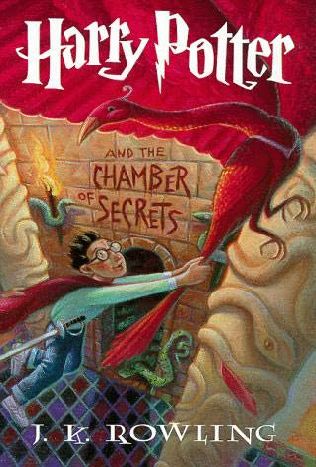 I think there’s a good subset of fans who consider Chamber of Secrets the weakest of the series. I have always been a part of this group. So it was with a mixture of determination and resolve that I approached re-reading the second book as part of my quest to re-read the whole series and record the experience.
I think there’s a good subset of fans who consider Chamber of Secrets the weakest of the series. I have always been a part of this group. So it was with a mixture of determination and resolve that I approached re-reading the second book as part of my quest to re-read the whole series and record the experience.
I suppose this is where I should say, “However, on re-reading I found it was actually much better than I anticipated.” To an extent I did find that, but the truth is that after re-reading Number 2, it’s still my least favorite. My old stand by complaints are still there. I’m going to give them a little space here, before I move into what works.
My biggest issue in re-reading 2 is the feeling that if the whole series had been like Chamber of Secrets not only would the series have never reached the heights that it once did, it probably would have failed to even hold my interest. The action is common place, and not particularly complex. The threat isn’t particularly well established (even once Hermione ends up petrified, there’s not a real sense of loss. Compare that with Mr. Weasley in Book 5, and it’s almost overwhelming how much better Rowling gets at upping the emotional stakes), the mystery (although mysterious) isn’t that engaging, and the sense of Hogwarts, so essential to fleshing out the later books, isn’t there yet. In fact, in Book 2 Harry Potter feels like any other children’s fantasy book, and not like a multi-trillion dollar phenomenon totally deserving of all its hype.
In a lot of ways, Chamber just rehashes the plot structure of book one in a way that is far more formulaic than any subsequent books. Harry comes to school after fussing with the Dursleys, he settles into his life, he struggles in school, excels in Quidditch (but doesn’t win), there’s a threat that lurks by the edge of the action (but we’re fairly certain won’t appear until final exams), about halfway through half the student body turns against Harry and his friends, and in the end Dumbledore is sent away and Harry has to face the danger by himself. In fact, it’s these predictable rhythms that probably helped to pull young readers in and prepare them to deal with the by-far-m0re-complicated later stories, but in re-reading it as an adult, it makes the stories feel a bit too pat.
The other problem with the book is Harry himself. In book 2, he’s still a perfect, blank protagonist child. He rarely does anything for reasons other than noble ones, and although he makes mistakes, they’re understandable mistakes. In other words, he doesn’t feel like a real kid yet. He doesn’t have his own, complicated internal thought process. He’s perfectly linear. He’s too one dimensional.
But… and you knew this was coming… HP 2 is also a lot better than I ever gave it credit for. It sets up plot points and themes that will only come into fruition three, four and five books later (that’s right, Horcruxes, pensieves, Tom Riddle’s family history, Lucius Malfoy as death eater). Rowling is already a master plotter, and the overall books’ plots are already moving strong (much stronger than you could possibly know, just having read Book 2).
And even though I say that it’s definitely the weakest of the books, that’s not saying much. It’s a lot like most children’s literature, and I love children’s lit. Book 2 is probably deserving of more respect than it gets, but coming before the PHENOMENAL Book 3 (my favorite, by the by) it’s hard not to think of it as a stop gap before Rowling got into the good stuff.

